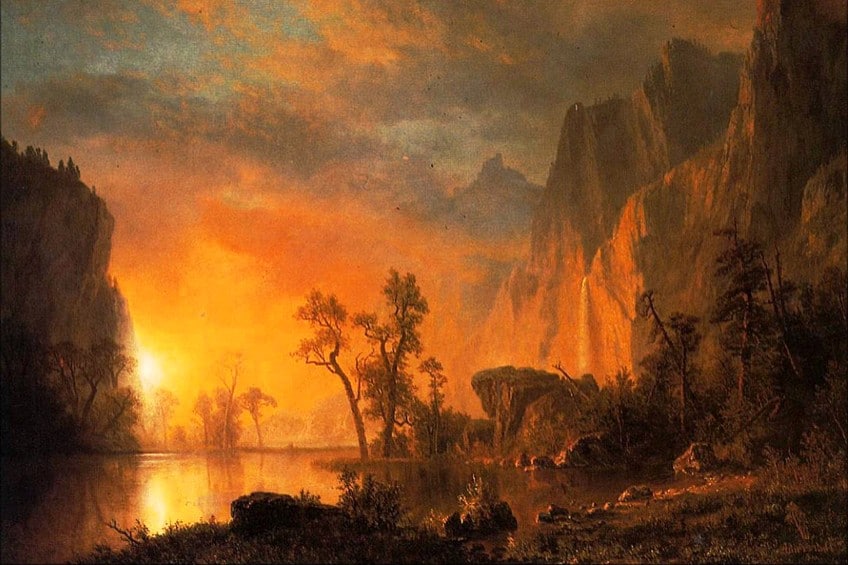Famous Paintings of Sunsets – The Best Painting of a Sunset
Celestial bodies have been a leading subject of inspiration for many great art masters in art history and have resulted in some of the most stunning landscapes featuring magnificent sunsets in various locations. However, not all sunsets look the same. This article will explore the top 10 most famous sunset paintings in art history.
The Sunset as a Subject
Capturing the sunset, whether it be through a photograph or painting is an activity that continues to be practiced by all, old and young. The main attraction, the sun, has been at the forefront of art since the beginning of human civilization and was previously associated with many cultural practices and ritual ceremonies. While many people put in more effort to admire a sunrise, the sunset is the most accessible to the human body clock and has captivated our eyes for centuries.
Since the sun plays such a huge role in our everyday lives and functioning, it has also been the subject of exploration in painting for many artists.
The sun is the Earth’s primary source of light and as you might imagine, there would be no color without light and no art without color or light. Many artists chose to paint the sunset as a means to display and hone their skills in the depiction of warm light as it fades to dusk and signals the end of the day.
Top 10 Most Famous Paintings of Sunsets
Many sunset paintings in art have also been inspired by natural disaster events such as volcanic eruptions, which appear in many paintings that depict sunsets with extra red hues. This is just one example of the value that sunset paintings hold for researchers since they can help identify the climate of certain periods, especially if they coincided with a natural disaster. Below, you will find the top 10 most famous sunset paintings in art history.
Sunset (Brothers) (1830 – 1835) by Caspar David Friedrich
| Artist | Caspar David Friedrich (1774 – 1840) |
| Date | 1830 – 1835 |
| Medium | Oil on canvas |
| Dimensions (cm) | 25 x 31 |
| Where It Is Housed | Hermitage Musem, St. Petersburg, Russia |
Caspar David Friedrich is regarded as one of the most popular German painters of the 18th and 19th centuries, made famous for his mastery over landscapes. This incredibly famous sunset painting, Sunset (Brothers), also called Evening Landscape with Two Men, is a well-known Romantic painting of a sunset that portrays two men, presumably brothers, dressed in long robes with hats standing before the sunset with their backs facing the viewer.
The background is filled with an image of the setting sun, just as it is about to disappear into the horizon.
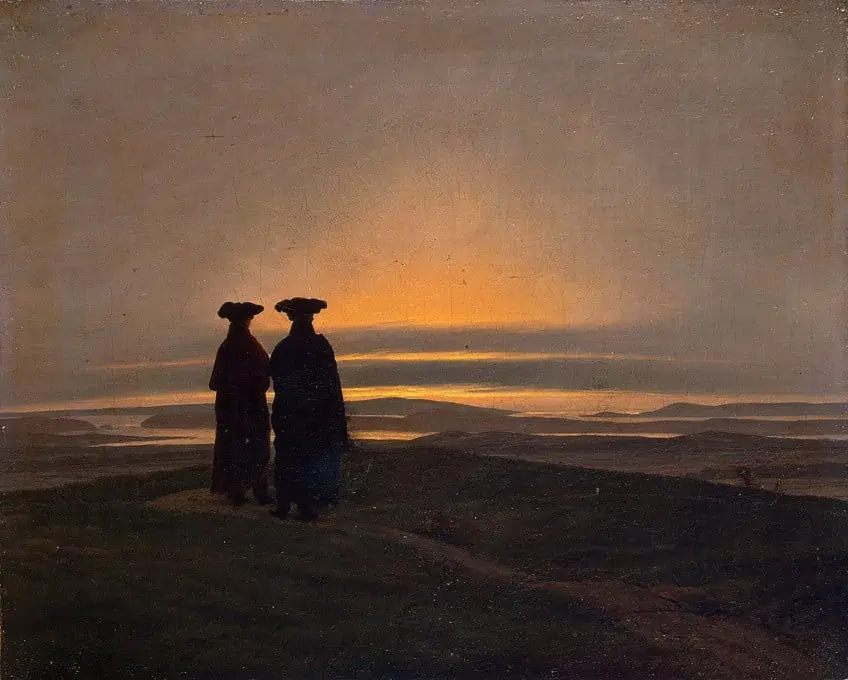
The mood of the painting is determined by its color scheme comprising a combination of orange hues with dark tones to depict the final stages of a sunset, which is not as bright and vivid as a sunset at its prime. The painting is also devoid of any vegetation and emphasized the effect of the remaining light on the silhouettes of the brothers.
Sun Setting over a Lake (c. 1840) by J. M. W. Turner
| Artist | Joseph Mallord William Turner (1775 – 1851) |
| Date | c. 1840 |
| Medium | Oil on canvas |
| Dimensions (cm) | Support: 91.1 x 122.6, Frame: 107.4 x 137.7 x 7.8 |
| Where It Is Housed | Tate Gallery, London, United Kingdom |
This famous sunset painting by Joseph Mallord William Turner is among the artist’s most famous paintings that depict the bright red and orange sky illuminated by the sun and its light that stretches across the water. The right portion of the painting illustrates what appears to be snow from the Alpine mountains around Lake Lucerne, which was a site that Turner often turned to for inspiration during the mid-19th century.
Turner was a prodigy painter from an early age and was recognized as one of the best painters of his generation.
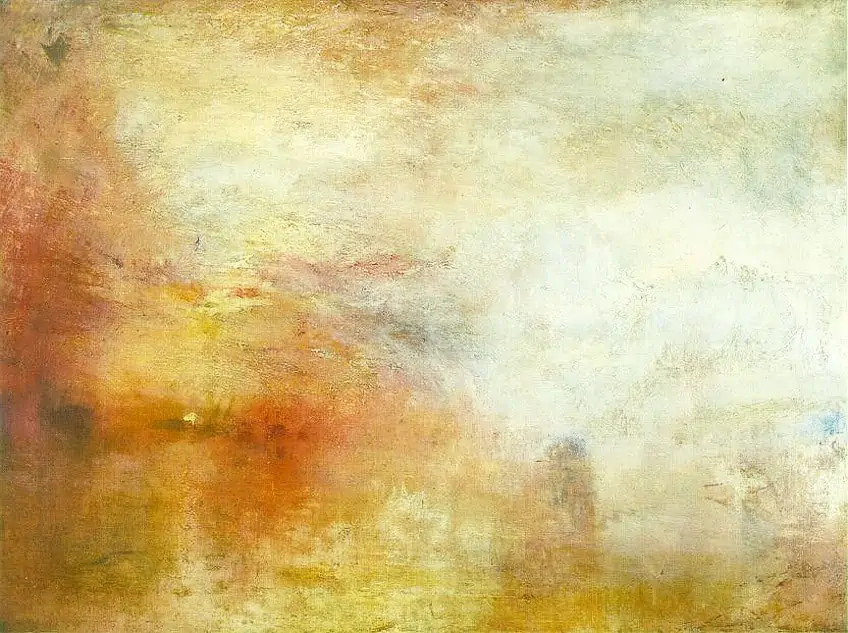
The Ninth Wave (1850) by Ivan Aivazovsky
| Artist | Ivan Konstantinovich Aivazovsky (1817 – 1900) |
| Date | 1850 |
| Medium | Oil on canvas |
| Dimensions (cm) | 221 x 332 |
| Where It Is Housed | State Russian Museum, St. Petersburg, Russia |
This popular 1850 painting of a sunset is set against the legend of the destructive wave of the ocean that appears to approach the marine vessel at a fast rate. Created by Ivan Aivazovsky, The Ninth Wave is one of the Russian painter’s best works and was the first painting to join the collection of Emperor Alexander III at the Russian Museum in 1897.
The painting features a brilliant ray of light emanating from the sunset that represents a ray of hope in the face of the powerful and dreaded wave.
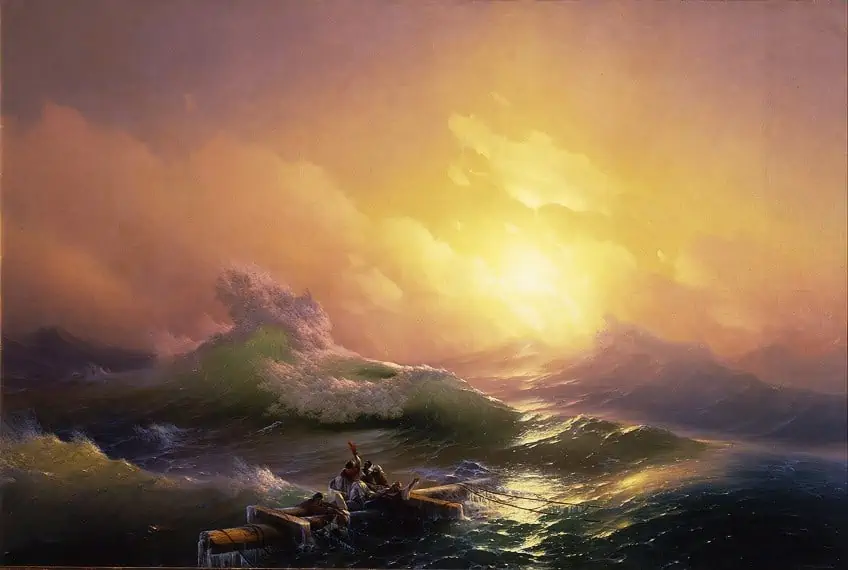
A small group of people is seen clinging to the wreckage of a ship in a desperate attempt to survive the storm-ridden sea. The legend of the ninth wave served as an allegory and symbol for people to signify the victory of humanity and solidify the faith of people in life. The beauty that Aivazovsky captures is seen in the way the light from the sunset reflects on the water of the sea leading down to the direction of the stranded sailors.
It seems as if the light were guiding the way forward for faith in the hope of life after destruction.
The Angelus (1857 – 1859) by Jean-François Millet
| Artist | Jean-François Millet (1814 – 1875) |
| Date | 1857 – 1859 |
| Medium | Oil on canvas |
| Dimensions (cm) | 66 x 55 |
| Where It Is Housed | Musée d’Orsay, Paris, France |
The Angelus is a sunset painting created during the Realism movement by the founder of the Barbizon school and French artist, Jean-François Millet. The painting depicts the harsh environment of the common citizens of France during the mid-19th century with a man and woman standing in a field. The sunset illuminates the figures as they pray. The praying figures are said to represent the desperation that many people faced during this time and their hopes that their crops would yield sufficient produce.
Although the scene is somber, it is still one of the most famous sunset paintings of the 19th century.
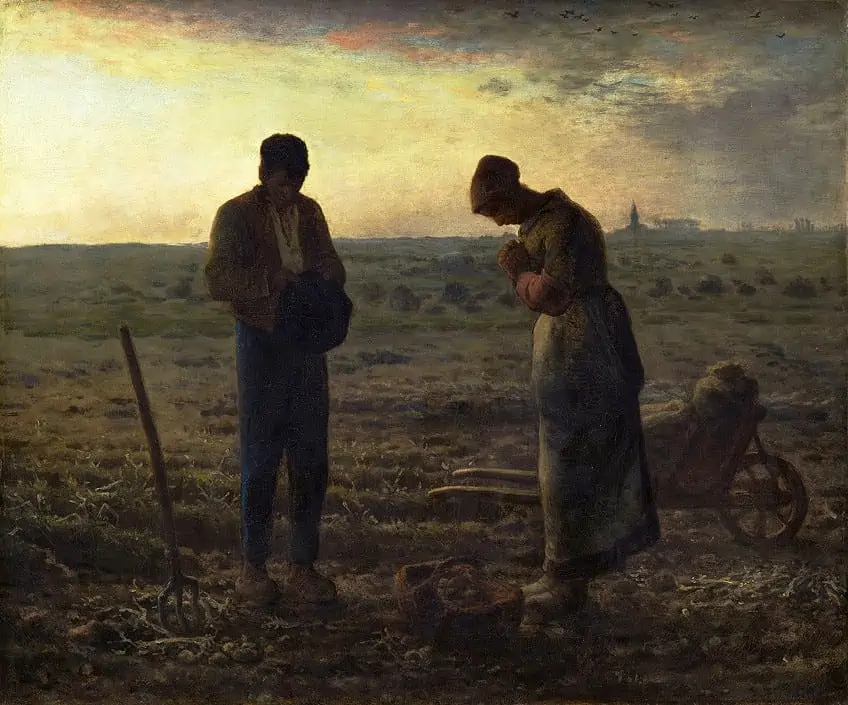
Sunset in the Rockies (1866) by Albert Bierstadt
| Artist | Albert Bierstadt (1830 – 1902) |
| Date | 1866 |
| Medium | Oil on canvas |
| Dimensions (cm) | 66.04 x 91.44 |
| Where It Is Housed | Private collection |
German-American painter Albert Bierstadt was famous for his magnificent and Romantic landscapes of the American West and was one of the pioneering artists to record the sites during the Westward Expansion. Bierstadt established himself as a master over the depiction of landscapes that often-featured spectacular sunsets that capture the light of the sun before it fades from view.
The fiery glow of the sun appears on the left of the painting, creeping away as its light glistens on the river valley below.
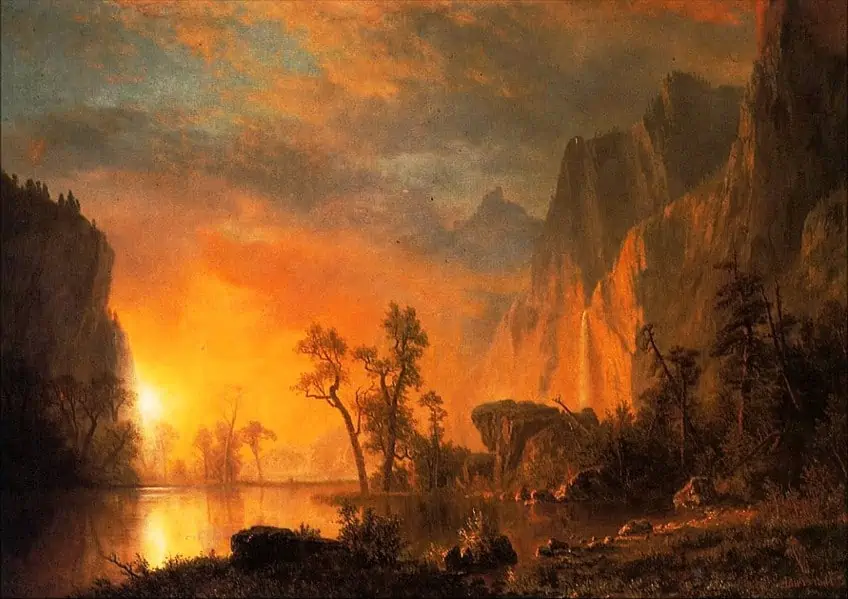
Sunset in the Rockies is one of his best paintings of a sunset that portrays a landscape from the American West, the Rocky Mountain region, which must have intrigued many at the time since the vast expanse was a mystery to a lot of people back then.
The painting received tons of praise and was showcased to people who had never seen the West before and were situated on the eastern side of the United States.
The Red Vineyard (1888) by Vincent van Gogh
| Artist | Vincent Willem van Gogh (1853 – 1890) |
| Date | 1888 |
| Medium | Oil on canvas |
| Dimensions (cm) | 75 x 93 |
| Where It Is Housed | Pushkin State Museum of Fine Arts, Moscow, Russia |
The Red Vineyard is one of the most famous paintings of a sunset created by the equally famous Vincent van Gogh. The painting is said to be the only painting that was sold by the artist while he was alive. Van Gogh remains one of the most admired artists of all time and his painting style only accentuates his rendition of a sunset as seen in the vibrant landscape of a vineyard in Arles.
Van Gogh interpreted the natural landscape in a style that is still very much unique to the artist’s work, defined by wavy impasto layers of paint to create striking, kinetic, and impressionable works of art.
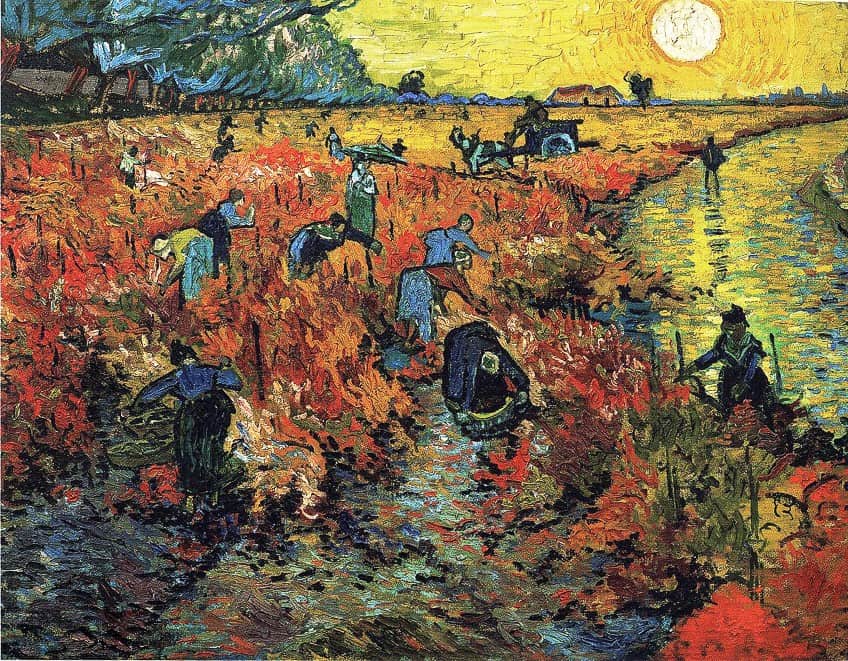
The Red Vineyard is one such example of Van Gogh’s mastery over enigmatic colors like red, bright yellow, and orange, to illustrate the vibrancy of the scene during the fall of 1888. With the emergence of Impressionism and post-Impressionism, artists were able to express their ideas of what reality looked like to them and favored the depiction of subjective realities as opposed to a realistic depiction.
The rise in the burst of color in many paintings is also what helped artists to create such stunning paintings with more emotion and impact than a realistic depiction of a sunset would.
Sunset at Eragny (1890) by Camille Pissarro
| Artist | Jacob Abraham Camille Pissarro (1830 – 1903) |
| Date | 1890 |
| Medium | Oil on canvas |
| Dimensions (cm) | 65.2 x 81.3 |
| Where It Is Housed | Israel Museum, Jerusalem, Israel |
Sunset at Eragny by Camille Pissarro is one of the French Impressionist’s best paintings illustrating a wonderful impression of the sunset through purple and yellow hues. Pissarro was an experimental artist and tested out many different painting techniques to illustrate a variety of landscapes according to the way that the sun’s light altered the colors and shifted natural hues. In Sunset at Eragny, Pissarro managed to capture the essence of a sunset by focusing on the brightness of the light and how this brightness informed the beauty of the landscape and the sky.
Pissarro’s intention was to paint an image of the sunset in the magical moment it was about to disappear.
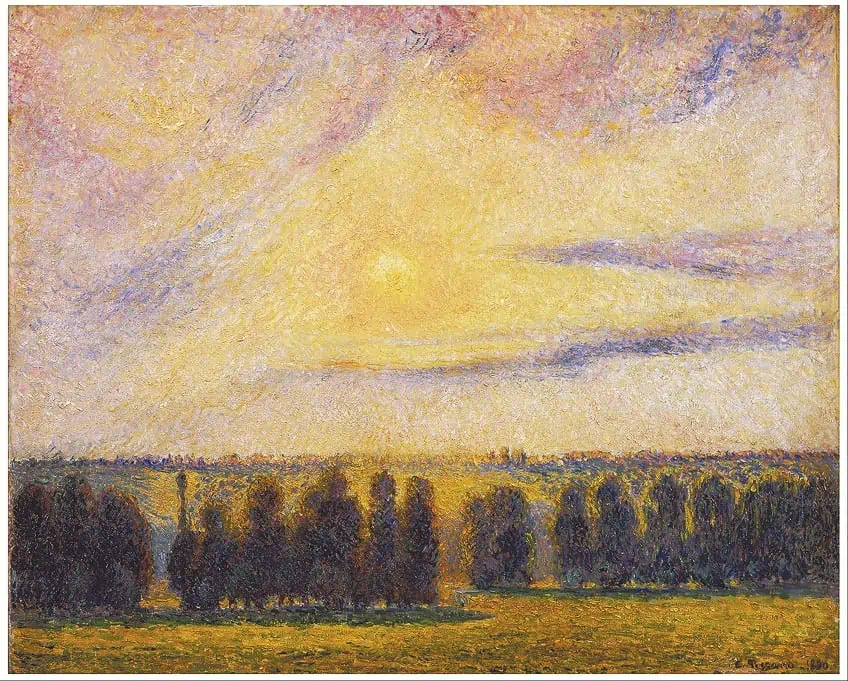
The Scream (1893) by Edvard Munch
| Artist | Edvard Munch (1863 – 1944) |
| Date | 1893 |
| Medium | Oil on canvas |
| Dimensions (cm) | 91 x 73.5 |
| Where It Is Housed | National Gallery and Munch Museum, Oslo, Norway |
One would not guess that the sunset in the backdrop of this iconic painting by Edvard Munch, The Scream, would, in reality, be an accurate depiction of the effects of the volcanic eruption of Krakatoa at the time. According to research on sunset paintings like this one, a sunset painting with a lot of red indicates the amount of pollution in the air. The painting is often analyzed with the focal subject of a screaming figure at the forefront but many do not pay much attention to the background, which is riddled with rich orange and red hues.
A theory on the use of these colors as the background suggests that this was Munch’s memory of the effects that he witnessed from the eruption and is said to be one of art history’s most important screams.
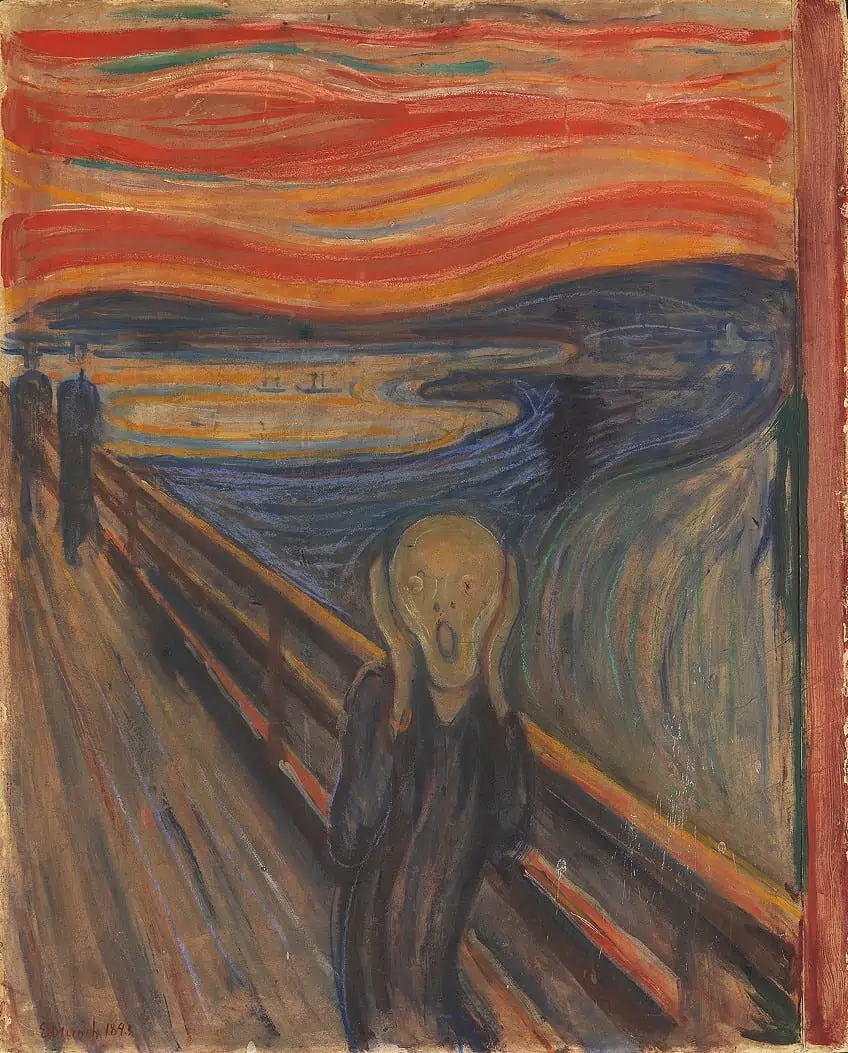
The Houses of Parliament, Sunset (1903) by Claude Monet
| Artist | Oscar-Claude Monet (1840 – 1926) |
| Date | 1903 |
| Medium | Oil on canvas |
| Dimensions (cm) | 81.3 x 92.5 |
| Where It Is Housed | National Gallery of Art, Washington, D.C., United States |
The beginning of the 20th century also saw a rise in the popularity of certain subject matter and the London Houses of Parliament on the river Thames was no exception. Painted by famous French Impressionist, Claude Monet, The House of Parliament, Sunset is a 1903 painting of a sunset depicting a rich array of purple and orange hues that accentuate the atmospheric conditions of a winter’s afternoon.
The painting is packed with rich visual imagery as the reflection of the Palace of Westminster on the river adds another level of depth to the image and draws attention to the illumination of the setting sun.
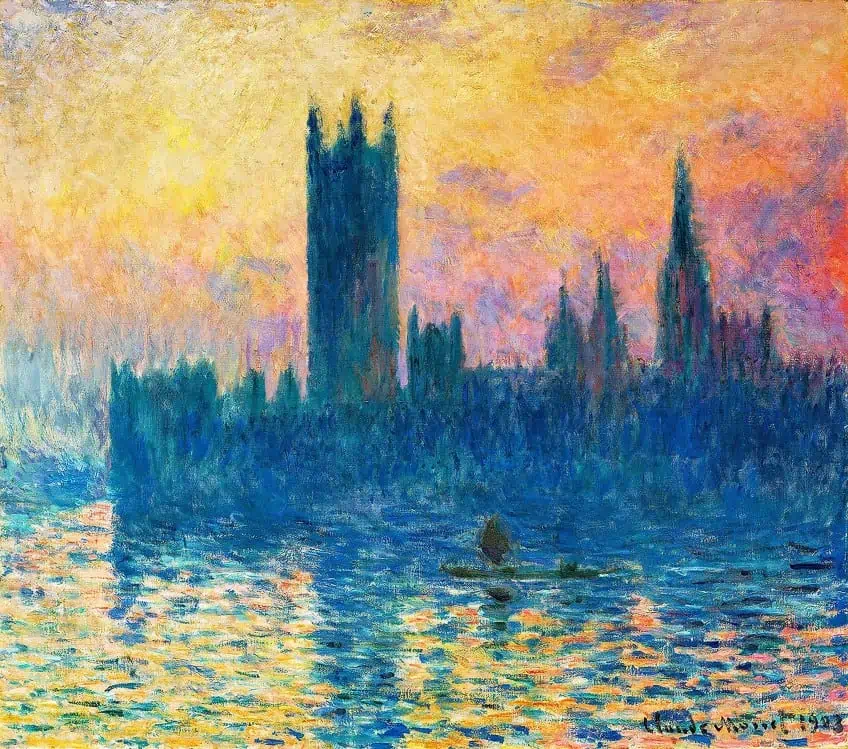
The way that Monet rendered the building and its rooftops also evoke an eerie feeling and the building appears as more of a shadow and reflection rather than an actual building. The identifying features of the building are seen through its classic building scape defined by its jagged English Perpendicular Gothic architectural features on the rooftop. The House of Parliament, Sunset is a great example of one of the ways that an artist can use light to illuminate an iconic landmark, such as the Palace of Westminster.
Another incredibly popular sunset painting by Monet is San Giorgio Maggiore at Dusk, which was created between 1908 and 1912.
Sunset, Long Island (1939) by Georgia O’Keeffe
| Artist | Georgia Totto O’Keefe (1887 – 1986) |
| Date | 1939 |
| Medium | Oil on canvas |
| Dimensions (cm) | 25.4 x 35.6 |
| Where It Is Housed | Private collection |
Georgia O’Keefe produced some of the best paintings of American Modernism and this painting of a sunset is one of them. Sunset, Long Island was painted in 1939 and makes use of flat colors with an almost monochromatic value on its surface to depict the sunset at Long Island with a gentle orange sun positioned above the Hudson River.
O’Keefe is recognized as not only the mother of all American Modernism itself but as a master of landscape paintings featuring scenes of New Mexico, New York cityscapes, and enlarged flowers.
Sunsets have been at the center of human fascination for as far back as one can recall. Many great artists of art history have all tried their hand at depicting the glorious sun and the way that it shed light on the beauty of the natural environment of the 19th and 20th centuries.
Take a look at our sunset paintings webstory here!
Frequently Asked Questions
Who Is the Most Famous Sunset Painter?
The most famous sunset painter is considered to be Oscar-Claude Monet, who was a French Impressionist who included many sunsets in his landscape paintings.
What Is the Most Well-Known Painting of a Sunset?
The most well-known painting of a sunset is San Giorgio Maggiore at Dusk by Oscar-Claude Monet, which was painted between 1908 and 1912 and is part of a series of sunset paintings of the different views of San Giorgio Maggiore.
What Is the Most Expensive Painting of a Sunset?
The most expensive painting of a sunset was sold for $119.9 million in 2012 and was one of four Edvard Munch’s The Scream (1895) paintings, which is not entirely recognized as a sole painting of a sunset but features one in the background. Alongside The Scream is Claude Monet’s 1890 painting Meules, which also features a sunset landscape and sold for $110.7 million in 2019.
Liam Davis is an experienced art historian with demonstrated experience in the industry. After graduating from the Academy of Art History with a bachelor’s degree, Liam worked for many years as a copywriter for various art magazines and online art galleries. He also worked as an art curator for an art gallery in Illinois before working now as editor-in-chief for artfilemagazine.com. Liam’s passion is, aside from sculptures from the Roman and Greek periods, cave paintings, and neolithic art.
Learn more about Liam Davis and about us.
Cite this Article
Liam, Davis, “Famous Paintings of Sunsets – The Best Painting of a Sunset.” artfilemagazine – Your Online Art Source. October 28, 2022. URL: https://artfilemagazine.com/famous-paintings-of-sunsets/
Davis, L. (2022, 28 October). Famous Paintings of Sunsets – The Best Painting of a Sunset. artfilemagazine – Your Online Art Source. https://artfilemagazine.com/famous-paintings-of-sunsets/
Davis, Liam. “Famous Paintings of Sunsets – The Best Painting of a Sunset.” artfilemagazine – Your Online Art Source, October 28, 2022. https://artfilemagazine.com/famous-paintings-of-sunsets/.


